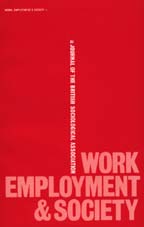Crossref Citations
This article has been cited by the following publications. This list is generated based on data provided by
Crossref.
Knights, David
and
McCabe, Darren
2000.
`Ain't Misbehavin'? Opportunities for Resistance under New Forms of `Quality' Management.
Sociology,
Vol. 34,
Issue. 3,
p.
421.
Dawson, Patrick
2000.
Technology, Work Restructuring and the Orchestration of a Rational Narrative in the Pursuit of 'Management Objectives': The Political Process of Plant-level Change.
Technology Analysis & Strategic Management,
Vol. 12,
Issue. 1,
p.
39.
Taylor, Steve
and
Tyler, Melissa
2000.
Emotional Labour and Sexual Difference in the Airline Industry.
Work, Employment and Society,
Vol. 14,
Issue. 1,
p.
77.
Appelbaum, Eileen
and
Berg, Peter
2001.
Sourcebook of Labor Markets.
p.
271.
Bélanger, Jacques
2001.
Autorégulation du travail et division sociale : observation dans une aluminerie québécoise.
Sociologie du travail,
Vol. 43,
Issue. 2,
p.
159.
Rees, Chris
2001.
Worker Responses to Quality Organisation: Discourse and Materiality in Organisational Change.
Work, Employment and Society,
Vol. 15,
Issue. 4,
p.
743.
Bradshaw, Matt
2001.
Newsprint Mills in Australia: A story of shifting optimum location.
Australian Geographer,
Vol. 32,
Issue. 2,
p.
241.
Armstrong, Peter
2001.
Styles of Illusion.
The Sociological Review,
Vol. 49,
Issue. 2,
p.
155.
Bélanger, Jacques
2001.
Autorégulation du travail et division sociale : observation dans une aluminerie québécoise.
Sociologie du Travail,
Vol. 43,
Issue. 2,
p.
159.
Taylor, Scott
Thorpe, Richard
and
Down, Simon
2002.
Negotiating Managerial Legitimacy in smaller Organizations: Management Education, Technical Skill, and Situated Competence.
Journal of Management Education,
Vol. 26,
Issue. 5,
p.
550.
Taylor, Steve
2002.
Attacking the Cultural Turn: Misrepresentations of the Service Encounter.
Sociological Research Online,
Vol. 7,
Issue. 1,
p.
115.
Rosenthal, Patrice
2004.
Management Control as an Employee Resource: The Case of Front‐line Service Workers.
Journal of Management Studies,
Vol. 41,
Issue. 4,
p.
601.
Germov, John
2005.
Managerialism in the Australian public health sector: towards the hyper‐rationalisation of professional bureaucracies.
Sociology of Health & Illness,
Vol. 27,
Issue. 6,
p.
738.
Beil‐Hildebrand, Margitta B.
2005.
Instilling and distilling a reputation for institutional excellence.
Journal of Health Organization and Management,
Vol. 19,
Issue. 6,
p.
440.
Maconachie, Glenda
2005.
Emotional Suppression to Regulated Empathy: From One Face of Control to Another.
Labour and Industry,
Vol. 16,
Issue. 1,
p.
43.
Guthey, Eric
2005.
Management Studies, Cultural Criticism and American Dreams.
Journal of Management Studies,
Vol. 42,
Issue. 2,
p.
451.
Kick, Edward L.
Fraser, James C.
and
Davis, Byron L.
2006.
Performance Management, Managerial Citizenship and Worker Commitment: A Study of the United States Postal Service with Some Global Implications.
Economic and Industrial Democracy,
Vol. 27,
Issue. 1,
p.
137.
O'Mahoney, Joe
2007.
Constructing habitus: the negotiation of moral encounters at Telekom.
Work, Employment and Society,
Vol. 21,
Issue. 3,
p.
479.
2007.
Management Accounting Change.
p.
506.
Spicer, André
Alvesson, Mats
and
Kärreman, Dan
2009.
Critical performativity: The unfinished business of critical management studies.
Human Relations,
Vol. 62,
Issue. 4,
p.
537.




